
The history of the Kyrgyz people and the land now called Kyrgyzstan goes back more than 3,000 years. Although geographically isolated by its mountainous location, it had an important role as part of the historical Silk Road trade route. Turkic nomads, who trace their ancestry to many Turkic states such as the First and Second Turkic Khaganates, have inhabited the country throughout its history. In the 13th century, Kyrgyzstan was conquered by the Mongols; subsequently it regained independence but was invaded by Kalmyks, Manchus, and Uzbeks. In 1876, it became part of the Russian Empire, remaining in the USSR as the Kirghiz Soviet Socialist Republic after the Russian Revolution. Following Mikhael Gorbachev's democratic reforms in the USSR, in 1990 pro-independence candidate Askar Akayev was elected president of the SSR. On 31 August 1991, Kyrgyzstan declared independence from Moscow, and a democratic government was subsequently established.

Uzbekistan is a landlocked country in Central Asia. It is itself surrounded by five landlocked countries: Kazakhstan to the north; Kyrgyzstan to the northeast; Tajikistan to the southeast; Afghanistan to the south, Turkmenistan to the south-west. Its capital and largest city is Tashkent. Uzbekistan is part of the Turkic languages world, as well as a member of the Organization of Turkic States. While the Uzbek language is the majority spoken language in Uzbekistan, Russian is widely used as an inter-ethnic tongue and in government. Islam is the majority religion in Uzbekistan, most Uzbeks being non-denominational Muslims. In ancient times it largely overlapped with the region known as Sogdia, and also with Bactria.

The Republic of Uzbekistan is a presidential constitutional republic, whereby the President of Uzbekistan is head of state. Executive power is exercised by the government and by the Prime Minister of Uzbekistan.

Islam Abduganiyevich Karimov was an Uzbek politician who led Uzbekistan and its predecessor state, the Uzbek Soviet Socialist Republic, from 1989 until his death in 2016. He was the last First Secretary of the Communist Party of Uzbekistan from 1989 to 1991, when the party was reconstituted as the People's Democratic Party of Uzbekistan (O‘zXDP); he led the O‘zXDP until 1996. He was the President of the Uzbek SSR from 24 March 1990 until he declared the independence of Uzbekistan on 1 September 1991.
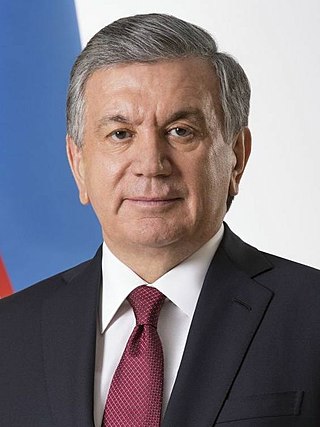
Shavkat Miromonovich Mirziyoyev is an Uzbek politician who has served as President of Uzbekistan and Supreme Commander-in-Chief of the Armed Forces of Uzbekistan since 14 December 2016. Previously, Mirziyoyev led the government as a Prime Minister of Uzbekistan from 2003 to 2016.
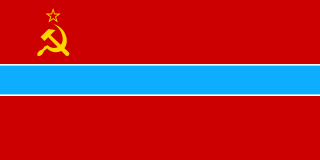
The Uzbek Soviet Socialist Republic, also known as Soviet Uzbekistan, the Uzbek SSR, UzSSR, or simply Uzbekistan and rarely Uzbekia, was a union republic of the Soviet Union. It was governed by the Uzbek branch of the Soviet Communist Party, the legal political party, from 1925 until 1990. From 1990 to 1991, it was a sovereign part of the Soviet Union with its own legislation.
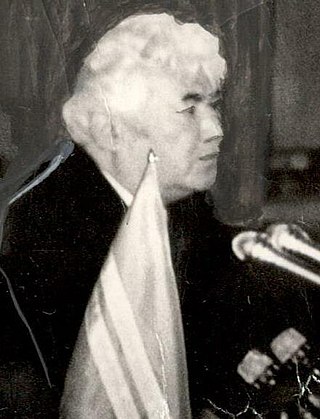
Rahmon Nabiyevich Nabiyev, also spelled Rakhmon Nabiev, was a Tajik politician who served as the First Secretary of the Communist Party of Tajikistan from 1982 to 1985 and twice as the 2nd President of Tajikistan from 23 September 1991 to 6 October 1991 and from 2 December 1991 to 7 September 1992. He was also partly responsible for the Tajik Civil War. Rising out of the regional nomenklatura, Nabiyev ascended to power in 1982 as First Secretary of the Communist Party of Tajikistan. In 1985, he was ousted in a corruption scandal.

The Erk Democratic Party is a political party in Uzbekistan formed in 1990 as a pro-independent party in the Soviet Union. It was the first registered political party in the history of Uzbekistan. Its charter was registered at the Ministry of Justice, Certificate of registration dated 3 September 1991, No. 039, which was signed by the minister of justice before the adoption of the law of Uzbekistan on political parties. The principal goals of activities, as written in the certificate on registration, are "the foundation of the independent democratic republic for Uzbekistan." Since 1993, its headquarters have been in Istanbul, Turkey.

The National Assembly, also transliterated as Milli Mejlis, is the legislative branch of government in Azerbaijan. The unicameral National Assembly has 125 deputies: previously 100 members were elected for five-year terms in single-seat constituencies and 25 were members elected by proportional representation; as of the latest election, however, all 125 deputies are returned from single-member constituencies.
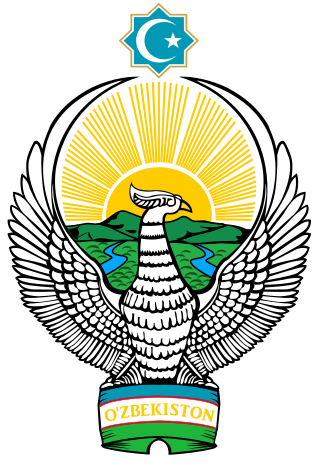
The president of the Republic of Uzbekistan is the head of state and executive authority in Uzbekistan. The office of President was established in 1991, replacing the position of Chairperson of the Presidium of the Supreme Soviet of the Uzbek SSR, which had existed since 1925. The president is directly elected for a term of seven years, by citizens of Uzbekistan who have reached 18 years of age.

The People's Democratic Party of Uzbekistan is a political party in Uzbekistan. It was founded in 1991 as the legal successor of the Communist Party of Uzbekistan. Under its founder Islam Karimov, it oversaw the dissolution of the Uzbek Soviet Socialist Republic and the establishment of the Republic of Uzbekistan. After Karimov resigned from the party in 1996 and later formed the Uzbekistan Liberal Democratic Party, it lost its ruling party status.
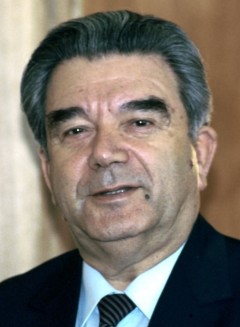
Rafiq Nishonovich Nishonov was the thirteenth First Secretary of the Communist Party of the Uzbek SSR. Nishonov held this position for 17 months, from 12 January 1988 to 23 June 1989. His replacement was Islam Karimov. Prior to that, he also served as the Chairman of the Presidium of the Supreme Soviet of the Uzbek SSR between 1986 and 1988. He was also Chairman of the Soviet of Nationalities from 1989 to 1991.

Inomjon Buzrukovich Usmonxoʻjayev served as the eleventh First Secretary of the Communist Party of the Uzbek SSR. Usmonxoʻjayev became General Secretary following the disastrous "Cotton Scandal".
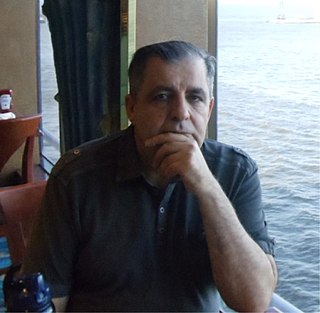
Jahangir Mamatov is a linguist, lexicographer, author, journalist, and a political analyst of Central Asian issues. He is a former member of the Uzbek Parliament and a co-author of Uzbekistan's Declaration of Independence. His writings, tenure in parliament, and other political activities were often greatly at odds with the Uzbek government. He was arrested but escaped into exile for many years. In 2005 he was instrumental in forming the democratic opposition group Congress of Democratic Uzbekistan (CDU) and became its first chairman. His writings are still banned in Uzbekistan.

Supreme Soviet elections were held in the Ukrainian SSR on 4 March 1990, with runoffs in some seats held between 10 and 18 March. The elections were held to elect deputies to the republic's parliament, the Verkhovna Rada. Simultaneously, elections of oblast councils also took place in their respective administrative divisions.
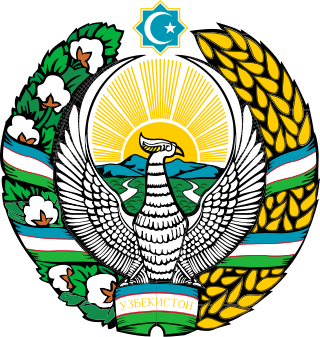
The office of Vice President of Uzbekistan was a political position in Uzbekistan until it was abolished on January 8, 1992. It was the title of the deputy to the President of Uzbekistan. Shukrullo Mirsaidov was the first and only holder of the office from 24 March 1990 to 8 January 1992.
Direct presidential elections were held for the first time in Uzbekistan on 29 December 1991. Their result was a victory for Islam Karimov of the People's Democratic Party of Uzbekistan, who won with 87% of the vote. Voter turnout was reported to be 94%. The elections were held alongside an independence referendum.

The Supreme Soviet of the Uzbek SSR was the supreme soviet of the Uzbek SSR from 1938 to 1991. The Supreme Soviet of the Uzbek SSR was preceded by the All-Uzbek Congress of Soviets which operated from 1925 to 1938. After the independence of Uzbekistan in 1991, the Supreme Soviet of the Uzbek SSR was briefly succeeded by the Supreme Council of the Republic of Uzbekistan from 1991 to 1994.

The Uzbek cotton scandal, also known simply as the cotton scandal or the Uzbek scandal, was a widespread corruption scandal in the Uzbek Soviet Socialist Republic beginning during the later years of the rule of Leonid Brezhnev and continuing until 1989.
Ali Habib oghlu Karimov was an Azerbaijani politician who held various high-ranking positions in the Azerbaijan SSR. His career included roles such as the Minister of Internal Affairs, the First Secretary of the Baku City Committee of the Azerbaijan Communist Party, and the Chairman of the State Labor Committee of the Azerbaijan SSR.




















